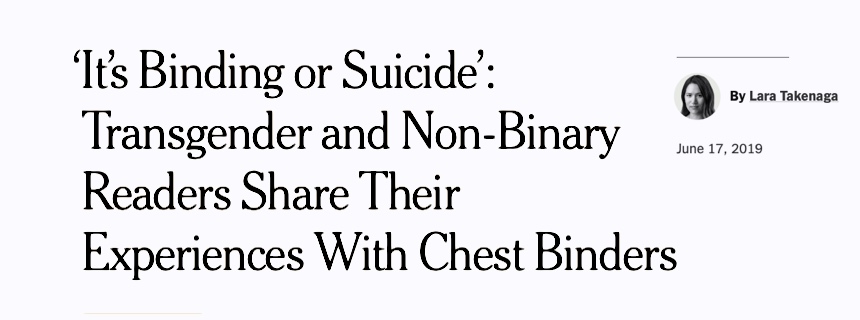Opinion
By Justine Kreher
The New York Times published an article about non-binary-identified individuals called, “The Struggles of Rejecting the Gender Binary.”
Some observations:
Not everyone identifies as male or female.
One can’t identify as male or female. A person is male or female based on their chromosomes, regardless of how feminized or masculinized they my be and wether or not these traits contribute to a person having gender dysphoria.
In the New York Times article Salem is a troubled 20-year-old biological male. Many “non-binary” people rely on cloths and makeup to express what gender they are or what gender they feel like they are on that day (more on gender stereotypes in gender ideology here). Sam is no different:
'Why didn’t you wear makeup today?’
Jan Tate asked her client during a therapy session in May of last year.
“I didn’t feel the need to.”
“Would today be the day to begin using Salem instead of Hannah?”
There was a long pause and a hushed reply: “Yeah. But it would hurt a lot worse to start asking people to call me Salem and have them not do it than not to ask them.”
Another quote that demonstrates the centrality of hair and make up in current youth trans/genderqueer culture and to the journalists who report on it:
Their brown hair fell with a loose curl just past their slim shoulders. Unlike two days before, when Salem arrived for therapy with their full lips in dark red lipstick and a dash of blush across each cheekbone, and with their long fingernails painted a bright lavender, this afternoon there was only the nail polish.
Salem, like many non-binary-identified teens and young adults, is being given hormones despite lack of clarity about what s/he want to achieve with them:
Tate switched the subject to the hormones Salem had been taking for two months: a low dose of spironolactone, a testosterone blocker, and estradiol, a type of estrogen. Salem felt driven to feminize their body, to lessen their constant alienation from their own anatomy — and their self-revulsion — but wasn’t at all sure what the right combination of feminine and masculine would be. Different days brought different answers. From the hormones, their breasts were buds. “I could foresee breasts bothering me,” Salem told Tate, though they believed they wanted them. “I just have to hope the hormones don’t make too big of a problem.”
It’s good to remember hormones have health consequences.
An observation from the therapist:
Even so, Tate commented tentatively that Salem seemed more confident since starting the hormones, that Salem seemed to be making progress in accepting themself.
I am skeptical of the therapist’s observation that this person is truly getting better. “Seemed” is a week word. I have witnessed seemingly very nice mental health professionals at gender conferences who sincerely want to do some good by supporting social / medical transition in cases that involved very troubled people. It’s an environment ripe for confirmation bias.
“While I’m presenting myself as more comfortable,” Salem mumbled, head bowed, “the feeling I have is that I hate myself.” They sometimes called themself a monster. Tate has another nonbinary client who cut themself relentlessly across their shoulders, leaving “scars on scars on scars” that the client asked Tate to touch. Weeks before this session, Salem stripped naked in their bedroom and, with a marker, scrawled “tranny” and “faggot” all over their body, slurs that were inaccurate but screamed their self-disgust.
This is the background of the MSW, LCSWA, MED, CSOTP, therapist. It is a common profile for therapists who work with non-binary identified individuals. It is a profile of a therapist who specializes in supporting and validating what I would call “outlier” identities and behavior.
Jan Tate, MSW, LCSWA, MEd, CSOTP is a psychotherapist with a dual background in clinical sexology and clinical social work. Jan Tate earned her MEd in Human Sexuality alongside her Master’s in Social Work at Widener University in Chester, PA. Her areas of expertise include working with adults in the kink, poly, trans, GNC/NB, and LGBTQ communities, along with sexual disorders and general sex therapy. She encourages sex positivity for people across the spectrum of power role identification, sexual orientation, gender expression, as well as those who are unsure of, questioning, or evolving through identifications. e had no
All people should be supported in what is healthiest for them in their lives and sexuality as long as they are not impacting other people negatively. Of all of the identities and behaviors listed above, it is the validation of gender expression that requires the participation of the outside world. And this is something that concerns me greatly, that psychologists and social workers are enthusiastically validating this without considering externalities or that there may be downsides to the youths themselves. I believe young people are being trained to believe their value and happiness relies on other people and that they are entitled to force other’s to view gender they way they do. This is what a 3rd gender pronoun requires of society. We are already seeing examples of high school teachers and University professors claiming young people are manipulating adults with “queer youth” pronoun culture, where a pronoun can be changed day to day, and anyone not going along with current gender ideology may be severely socially punished.
In a few studies non-binary-identifed youth have more problems than trans youth. It may be a manifestation of other mental health issues related to the gender dysphoria or something masking as gender dysphoria. There isn’t enough research to say for sure. But other examples in the media paint pictures of youth with shifting identities, body hatred issues, and a strong need for validation from others.





